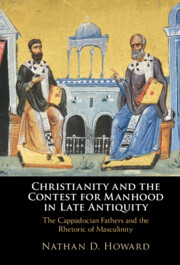 Christianity and the Contest for Manhood in Late Antiquity
Christianity and the Contest for Manhood in Late Antiquity Book contents
- Christianity and the Contest for Manhood in Late Antiquity
- Christianity and the Contest for Manhood in Late Antiquity
- Copyright page
- Dedication
- Contents
- Acknowledgments
- A Note on Translations
- Abbreviations
- The Cappadocian Fathers and their Families
- Introduction
- 1 “The Sweat of Eloquence”
- 2 The Agōn of Friendship
- 3 Hagiography and Masculinity
- 4 Agōn and Theological Authority
- Epilogue
- References
- Index
Introduction
Paideia, Masculinity, and Identity
Published online by Cambridge University Press: 10 November 2022
- Christianity and the Contest for Manhood in Late Antiquity
- Christianity and the Contest for Manhood in Late Antiquity
- Copyright page
- Dedication
- Contents
- Acknowledgments
- A Note on Translations
- Abbreviations
- The Cappadocian Fathers and their Families
- Introduction
- 1 “The Sweat of Eloquence”
- 2 The Agōn of Friendship
- 3 Hagiography and Masculinity
- 4 Agōn and Theological Authority
- Epilogue
- References
- Index
Summary
The Introduction discusses paideia (culture of Greek intellectuals) and its relevance for fourth-century clergy by providing a background to the Cappadocian Fathers. The chapter defines the meaning of "classical masculinity" for this study and places its treatment of gender into the broader scholarship on late antiquity and Christianity. The chapter outlines key concepts such as aretē (manly virtue), agathos (superior person), and asceticism (self-denial), and introduces agōn (contest or struggle) as the concept around which the book is organized. It also directs the reader to consider the Second Sophistic as the antecedent to the fourth-century culture of epistolary exhibitions. The chapter explains the differences in the Cappadocians’ use of genre and the distinguishing features of epistolography and hagiographic biography. And the Introduction explores identity theory and its usefulness for investigating gender and Christianity.
Keywords
- Type
- Chapter
- Information
- Christianity and the Contest for Manhood in Late AntiquityThe Cappadocian Fathers and the Rhetoric of Masculinity, pp. 1 - 62Publisher: Cambridge University PressPrint publication year: 2022
